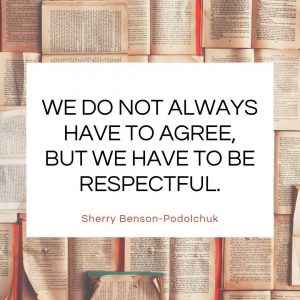Acceptance!
Why do we have a hard time with acceptance?
Acceptance is agreeing to receive something, being included in a group for example.
Why do we have such a hard time accepting behaviours and believing in an all-or-nothing?
Let’s face it, no matter what we do or where we go, there will always be people who don’t like us for whatever reason. There will always be places that we don’t want to be in. And yet, somehow we managed to get stuck in a situation, unhealthy workplace and unhealthy relationships. Yes, I have been in those unhealthy relationship shoes and unhealthy toxic workplace shoes. It was bloody awful.
We can learn from those mistakes. We have to accept where we are.
Acceptance also means excepting who we are in this moment. None of us grew up with perfect childhoods. Perfect parents where everything was happy, with no conflict, no harsh words, no violence? That’s a fantasy, it only happens on TV. Still, parents try their best based on their own patterns of behaviour that they observed and have taken into their adult life.
It’s important to remember that none of us have perfect listening, conflict resolution or communication skills as children. But that doesn’t mean we have to repeat the same patterns and accept those unhealthy patterns as adults.
We can change those unhealthy patterns with two more positive behaviours.
The first thing we need is awareness, and also acceptance, of what’s working in our lives and what’s not. Asking ourselves why, and then being proactive in seeking out support and professional help, if needed, two re-learn more effective ways of dealing with her own emotions and life events.
From the article in Psychology Today:
The Healing Power of Radical Acceptance
Help yourself to accept what is.
Practicing Acceptance
Radical acceptance skill requires practice. When you accept, you experience all thoughts and feelings. Without judgment, you’re allowing yourself to be frustrated, disappointed, sad, fearful, or whatever other feeling develops. Practicing acceptance every day fortifies self-compassion and prepares you when life’s most difficult experiences occur.
Pain is inevitable. Resisting reality delays healing and adds suffering to your pain. Because life is so precarious, we never know what may come our way, but we can create habits and coping skills predicated on radical acceptance to compassionately heal.
Here’s a personal story. I love Christmas. Everybody knows how much I love Christmas. Christmas lights come out, Tree goes up on November 15 and comes down on January 15. For me, Christmas is an opportunity to have fun, bake a lot of goodies, and celebrate with the people I love and cherish. However, that’s not the same interpretation and feeling other people may experience around Christmas. You see my mother made Christmas incredibly awesome for her seven children.
My entire childhood was filled with each Christmas being one of excitement, family visiting, grandma’s famous pies, food, and lots of fun. It was later in life when I realized and had to come to accept that not everyone in life especially my mom experienced that same type of joy. Definitely, she worked hard to make sure we had a wonderful Christmas Day ensuring each child had the same number of presents and size of presents so that no one felt left out. A difficult thing to do on a fixed budget and with limited support. However, she did it. Every year and each of us has taken these fabulous ideas and created our own Christmas just to feel just as special.

I only have one child. And yes, I have to admit I may have gone overboard with the gifts at Christmas time. I loved it. Children grow up and become adults, and guess what? Their acceptance of Christmas can change. Over the years I’ve had to come to accept that my daughter doesn’t really like Christmas as much as I do. At first, there was some resistance from me when she was less than enthusiastic about coming home at Christmas time. As the years progressed, my partner and I have had to come to accept that we won’t have her here every Christmas season. It was a hard pill to swallow. As adults, we have to be willing to listen to and accept our children’s opinions, whether we agree or not. Using guilt, and manipulation was not an option and does not create a healthy lasting relationship of trust and love.
Relationships that are built on manipulation and shame or guilt never last. It took a while, but a couple of Christmases before I realized that in order to have a relationship built on love and trust including respect, I had to accept the fact that she may not want to come home for Christmas for her own reasons. Her voicing her concerns was not to be mean, nether spiteful, but because she wanted to do something special in her home with her partner and celebrate Christmas day, the holiday season in their own way. And that’s OK. It is OK. Life is OK. Christmas will be OK.
Most important is when we accept things we cannot change and accept the things we can change, which is usually our perspective and attitude. It’s amazing how less stressful life can be.

In essence, I am going to continue to celebrate Christmas full throttle and enjoy every minute. If we forget the meaning of Christmas which is to celebrate and cherish those we love, then this is something we can do every single day. With our words, actions, compassion, and acceptance of ourselves and others. Obviously, my tree is going up in November with colorful lights, decorations on Christmas Eve, baking, and good food on Christmas day and into the New Year. Remember to celebrate family on any day and share the love in your relationships.
